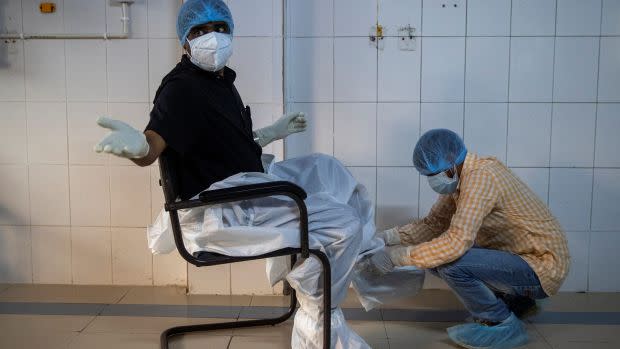How Indian doctors abroad are helping their country fight Covid

As India is ravaged by a crippling Covid-19 wave, members of the Indian diaspora are struggling to find ways to help. One group among them is especially distressed: doctors.
Physicians are one of India’s most prized exports, especially in the US where they make up 20% of all foreign-trained doctors. Together, Indians and Indian-American doctors are the most represented non-white group in the medical profession.
With the situation in their home country—or ancestral land—continuing to worsen, Indian doctors in the US find themselves in the situation where they have the skills to help, and yet are unable to do so. “It upsets me a lot because I think ‘I trained to be a doctor and I am away right now’,” says Ramya Pinnamaneni, a doctor from New Delhi, India, who is a researcher at Harvard School of Public Health.
The doctor is online
Pinnameni says she was on the verge of buying a ticket back to India when, after talking to her teammates here in the US—many of whom also Indian, or of Indian origin—she realized there isn’t much she would be able to do there, because of infrastructure shortages.
Instead, she and her team are focusing on ways to help from afar. One is through their research at the Viswanath Lab at Harvard, which focuses on making medical communication accessible to the pockets of society that are usually alienated by it.
For this crisis, the lab is developing a toolkit that debunks misinformation related to Covid-19, its treatment, ways to prevent it, and the vaccine. The toolkit, which is accessible online but is being printed to reach a broader public, already available in English and Hindi, is being translated into other Indian languages and disseminated through the country with the help of the Indian Ministry of Women and Child Development, as well as development organizations on the ground.
Among the information included in the toolkit are guidelines on whether to seek immediate medical attention for Covid-19 patients, in order to avoid unnecessary hospital rushes.
International doctors consulting online
Sreeni Gangasani is a cardiologist from Hyderabad working in Atlanta, Georgia. He and four of his classmates from high school, all doctors in the US, UK, and India, had been working on setting up eGlobalDoctors, a telehealth practice that would offer consultations to Indians seeking second opinions from specialists, when India was hit by its second Covid-19 wave.
After running a fundraiser with the American Association of Physicians of Indian Origin, which raised over $2 million to buy an oxygen concentrator and cylinders to ship to India, Gangasani and his team turned their remote healthcare practice into a volunteer effort to provide medical advice to Covid-19 patients in India.
With a shortage of doctors and panic about the coronavirus taking over, says Gangasani, many patients find themselves in a situation where they test positive and don’t know whether to go to the hospital or just care for their symptoms at home. For them, getting medical advice even remotely is key. Most of the doctors with eGlobalDoctors provide consultation from outside India, and therefore can’t write prescriptions, but most of their work is helping people assess the gravity of their symptoms and reviewing the treatments, and providing non-pharmacologic advice.
Medical volunteers through telehealth
The service is being advertised via social media groups and is now counting on more than 120 volunteers across several time zones in the US and UK, to provide coverage for long stretches of the day in India.
“On Sunday at four o’clock I sent my first Whatsapp message [about the service], and by 8:30 I had 30 patients,” says Gangasani.
While the majority of physicians volunteering to help with eGlobalDoctors are of Indian origin, many are not and have joined the effort, although they may face language barriers. So far, Gangasani says, about 60% of the visits are being conducted in English, and the rest in other Indian languages.
Since not all of the doctors are specialized in treating Covid-19, a training session is provided to volunteers before they start their shift. “It is a very gratifying experience to see these people, says Gangasani.
A similar effort is run by MDtok, a telehealth portal focused on providing second opinions. The platform started a charitable effort offering Covid-19 relief, and has listed a large selection of Indian and Indian-American physicians offering free appointments for Covid-19 patients in India.
Meanwhile, from India, doctors are suggesting temporary licensing of foreign physicians, so as to allow them to write prescriptions, too, if needed. However, that would require the Ministry of Health to acknowledge the lack of physicians, which it has been reluctant to do, alongside denying a shortage of oxygen, to protect its international reputation and reject the accusations that the crisis is out of control.
Sign up for the Quartz Daily Brief, our free daily newsletter with the world’s most important and interesting news.
More stories from Quartz:
Why is India, the world’s largest vaccine producer, running short of vaccines?
The Indian government has ordered its vaccine doses in fits and starts
